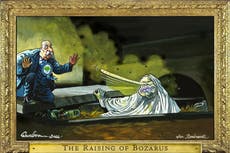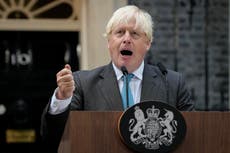How will the inquiry into whether Boris Johnson misled MPs over Partygate work?
Mr Johnson is thought to be privately urging MPs to back him in the leadership race
Boris Johnson is soon to face a grilling by the committee investigating whether he lied to the House of Commons over a series of parties held in Downing Street during the pandemic.
The Commons passed a motion tabled by Labour in April for the Commons privileges committee to launch an inquiry into whether Mr Johnson’s repeated denials that Covid lockdown rules were broken at No 10 amounted to contempt of parliament.
The probe was formally launched on 29 June this year by the senior Labour MP and investigation chair Harriet Harman, who confirmed at the same time that Mr Johnson would not face the scrutiny of the committee until the autumn.
It comes as the former Tory leader flies home from a Caribbean holiday and “takes soundings” about a potential leadership bid to replace Liz Truss, who resigned on Thursday.
Mr Johnson is thought to be privately urging MPs to back him, saying he is the only candidate able to save them from electoral wipeout.
On Friday afternoon, however, Conservative sources told ITV News that even if Mr Johnson returns to No 10 he could be “gone by Christmas” as a result of “damning new evidence” into Partygate being reviewed by Ms Harman.
“The fact he is standing at all whilst under investigation is shameful. It’s hardly the stability and unity everyone is calling for,” the source told the broadcaster.
As Mr Johnson continues to lay the groundwork for a potential return as prime minister, here’s a look at how the committee’s inquiry will work and what a finding of contempt could mean for Mr Johnson’s position.
Why is Boris Johnson being investigated?
The investigation began in the wake of the closure of the Metropolitan Police’s own inquiry into the string of lockdown-breaching gatherings held in No 10 during the Covid pandemic, as well as the publication of the Sue Gray report.
The police inquiry saw 126 fixed penalty notices issued for lockdown breaches to 83 people at No 10, including Mr Johnson.
And Ms Gray’s incendiary report, which looked into 15 events on 12 dates between May 2020 and April 2021, cited “failures of leadership and judgment in No 10 and the Cabinet Office,” “excessive alcohol consumption”, “unacceptable” treatment of junior staff, and “poor treatment of security and cleaning staff.”
But the investigation being conducted by the privileges committee is very much separate to the inquiries conducted by the police and Ms Gray.
This time round, the former PM is being investigated for allegations he deliberately misled parliament in statements he made to MPs in the House of Commons about breaches of lockdown rules in Downing Street.
As reports of parties first emerged last December, Mr Johnson told MPs that “all guidance was followed in No 10” and that “I have been repeatedly assured since these allegations emerged that there was no party and that no Covid rules were broken”.
After aide Allegra Stratton resigned for joking about events in No 10, he told the Commons that he was “sickened myself and furious about that”, but had been “repeatedly assured that the rules were not broken”.
He said that “the guidance was followed and the rules were followed at all times”.
Who conducts the investigation?
The inquiry will be conducted by the Commons privileges committee – a cross-party group tasked with considering the specific matters relating to privileges.
The committee is made up of six members and one chairperson. Conservative MPs are in a majority on the committee, with four MPs. There are two Labour MPs and one SNP MP.
Following a failed Conservative bid to block Ms Harman from leading the investigation on the basis she had previously tweeted her belief that the PM lied, she was unanimously elected in June as chair. At the same time, Appeal Court judge Sir Ernest Ryder was appointed as an adviser.
Ms Harman was parachuted in to replace Labour MP Chris Bryant, who shortly after the Commons agreed to investigate Mr Johnson recused himself over concerns about previous statements he had made in the media regarding the matter.
Mr Bryant said he hoped that “the House be seen to proceed fairly without any imputation of unfairness and that the whole House have confidence in the committee of privileges’ proceedings.”
What is the schedule for the inquiry?
On 29 June this year, it was announced that the committee had held its first meeting on the investigation, which it also used to submit a call for evidence.
This includes documents or photographs taken at the various No 10 gatherings which might include evidence of “Mr Johnson’s knowledge of the activities in 10 Downing Street and the Cabinet Office under Covid regulations, from the occurrence of those events until now; [and] any briefing given to, or inquiries made by, Mr Johnson relating to those events.”
The committee gave people a deadline of 29 July to submit their evidence, which it said would be followed by oral evidence sessions in the autumn. The decision to take both written and oral evidence was to protect the identity of witnesses who wished to remain anonymous.
This means that the committee’s final report will likely remain unpublished until late autumn or winter 2022.
What happens if the committee concludes that Mr Johnson deliberately misled parliament?
If the former prime minister is found to have deliberately misled parliament, the committee will also recommend potential sanctions for Mr Johnson to face.
Its recommendations will then be taken to the House of Commons for MPs to decide whether they should be approved or not.
Should Mr Johnson be found in contempt, he could be expelled from parliament – a sanction which would have to be approved by a vote of the whole Commons, which has the power to dismiss any MP.
The potential sanctions were, however, a little more complicated when Mr Johnson was still prime minister. And, with a potential upcoming bid for Tory leadership, the committee could find itself drawing up a separate set of recommendations should he find his way back in No 10.
In this case, Mr Johnson could face suspension from the Commons for a number of days. Alternatively, if the prime minister declined to resign after being found to have deliberately misled the Commons, MPs could submit letters to the backbench 1922 committee for a vote of confidence.
Notably, though, the ministerial code is firm in its rules that knowingly misleading parliament is a resigning matter. But enforcing this code is at the discretion of the PM.
Join our commenting forum
Join thought-provoking conversations, follow other Independent readers and see their replies
Comments





Bookmark popover
Removed from bookmarks